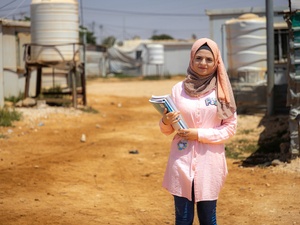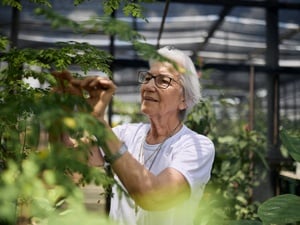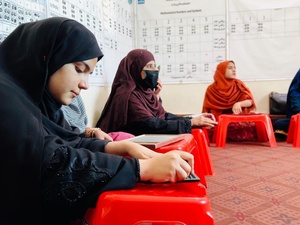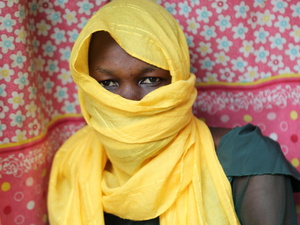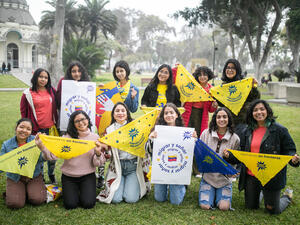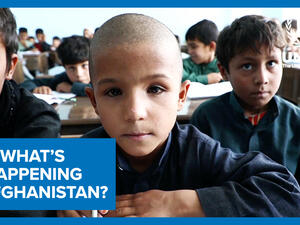Back from the brink in Buenos Aires
Back from the brink in Buenos Aires

After extricating herself from a violent relationship, Angèle – seen here on the outskirts of Buenos Aires – has gone from strength to strength.
BUENOS AIRES, Argentina, December 7 (UNHCR) - Angèle is tall and slender, her large dark eyes are impeccably made up and neat braids adorn her graceful ponytail. Wearing jeans and a loose white shirt, she turns many heads as she strides through the small neighbourhood on the outskirts of Buenos Aires where she now lives. Two weeks ago, she celebrated her 41st birthday and claims she has never felt so good.
At the age of 29, Angèle fled the growing instability and rampant human rights violations in her native Zaire. She arrived in Argentina as a refugee in 1993, with a toddler to care for, and no knowledge of her adoptive land. To make matters much worse, she came with a violent partner and the relationship soon deteriorated during the daily struggle to make ends meet.
"Our relationship had always been very difficult, and we had been on and off several times in Zaire. When we got to Argentina though, it became unbearable," she recalls. "He even tried to keep me away from my little boy. I'd dress to go with them to the park and he would say - Where do you think you're going? You're not coming with us. Go look at yourself in the mirror."
Worst of all, her partner also started psychologically abusing their three-year-old child, taunting him for being slow to start talking, even though the paediatricians said the slight delay was normal given the different languages the child was exposed to. Within a year Angèle had fled the relationship to take refuge with her son in a women's shelter.
She found the therapy sessions there difficult to cope with. "I felt like I was constantly reliving my problems as I spoke about them," she says. "When the therapist told me that I was partly responsible for having let the relationship degenerate so much, I couldn't take it and left the shelter."
Soon afterwards she attempted suicide, a desperate gesture that finally prompted her to end the relationship for good. Her son - who by then was speaking well - pushed her in that direction. His words still ring in her ears: "Mama, I kept calling your name and you wouldn't reply."
Angèle went back to the women's shelter and this time she stuck to the therapy. A year later, she left the shelter and was given custody of her young son. The boy's father never complied with the judge's order to undergo therapy before he could see his child.
While determined to get on with her life, Angèle was nevertheless still terrified of her former partner. "I used to take the underground just because I knew he was scared of using it," she says. "After a while I stopped caring, and I started walking everywhere. One day, I bumped into him in the middle of the street. I looked so different that at first he didn't recognize me, but then he started following me. I kept walking until I got to a policeman."
The man was warned to stay away from her and his child until he had complied with the judge's order. Angèle has not seen him since. In 1998, she fell in love with Fernando, an Argentine photographer whom she later married. Their daughter is now six and the couple are running a business together, after Angèle took photo-editing courses to help Fernando run his shop. The Argentine economic crisis of 2001 forced them to close down temporarily, but Angèle was able to help restart the business thanks to a small loan from the UN refugee agency.
Angèle was one of the first refugee women in the country to receive such a loan under UNHCR's micro-credit programme. Sergio Bertini, who works in MYRAR, the NGO that runs the programme on behalf of UNHCR, says that she stood out from the start because of her enthusiasm and creativity. She eagerly took part in MYRAR's business training courses and helped design the NGO's logo. She also paid back all the instalments on her first loan punctually, and has now taken out a second one. "To me, Angèle is a true entrepreneur," Bertini says.
Today, they have two shops, employ three Argentine assistants, and have recently bought new equipment, also with a loan provided by UNHCR. Her son, who is now 13, studies English after school and helps his parents by producing the English version of the shop's flyers. He is popular in the neighbourhood, an avid supporter of the River Plate soccer club, and is the goalkeeper in his school team.
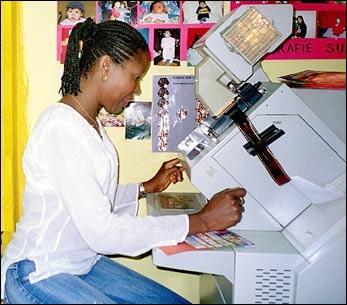
Angèle working in the photo shop she runs together with her husband, an Argentine photographer.
But it is his little sister, born in Argentina, who is most interested in her mother's heritage. She particularly enjoys trying out the Congolese dishes her mother cooks. Argentina has become home, and Angèle does not think of going back to DRC for more than temporary visits. Nevertheless, when acquaintances come to stay she always asks them to bring seeds from her native country so that she can grow Congolese vegetables in her Buenos Aires garden. "It is my way of bringing Africa a little closer to Argentina," she says.
Not content with just sorting out her own life, Angèle is eager to use her experience to help others. This includes giving interviews to the media in which she has encouraged other refugee women, or those in abusive relationships, not to give up or give in. She has lodged newcomers from DRC, sometimes for months on end, and is now working on bringing to Argentina an older niece who has had her own relationship problems and who could do with a drastic change. It is not easy for a refugee or an abused woman to become a role model - but Angèle is a woman who has both style and substance, and, above all, great determination.
By Nazli Zaki in Buenos Aires, Argentina


